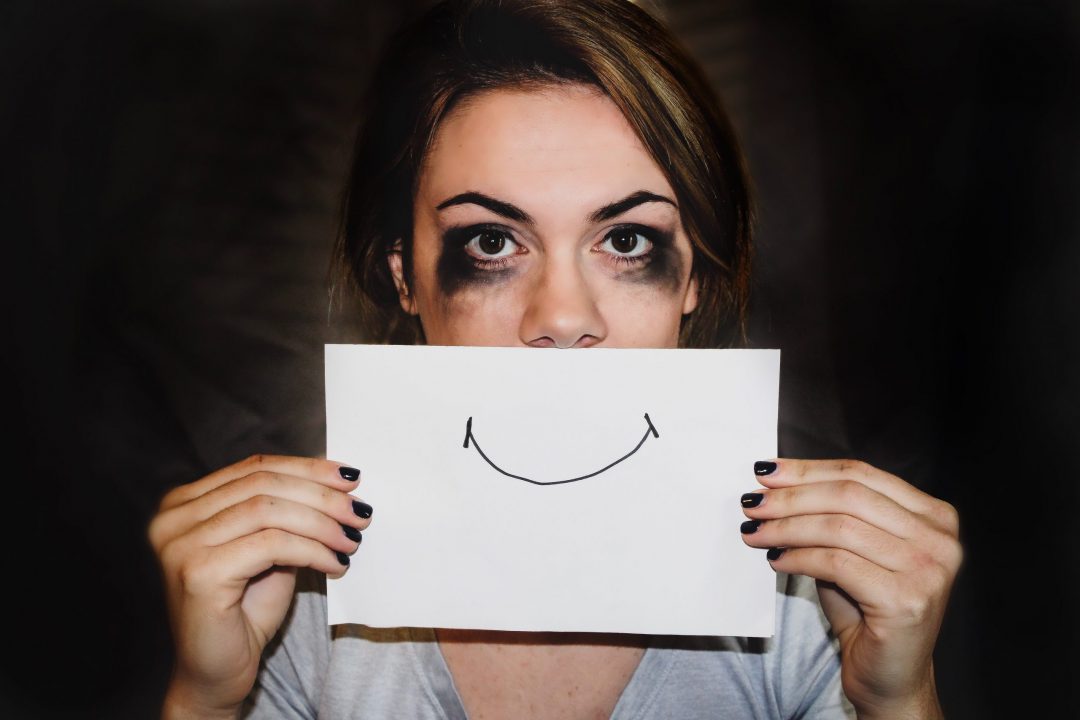Stress and anxiety about a disease can be overwhelming and cause strong emotions in adults and children.
In this blog, we will try to know what can be done to relieve stress and also what all impact will coronavirus put on mental health.
The outbreak of coronavirus disease may be stressful for people. The disease pandemic is a major health crisis affecting several nations, with over 2,481,925 cases.
Meanwhile, 170,456 confirmed deaths have been reported till now.
Hence,
such widespread outbreaks are associated with adverse mental health consequences.
On This Page
- Knowing Stress
- Knowing Anxiety
- Stress and COVID-19
- Can stress be beneficial?
- The phase of anxiety disorder after this disaster
- How to deal?
- What the Government and Doctors can do?
- Role of community
- Frequently Asked Questions
1) Knowing Stress?
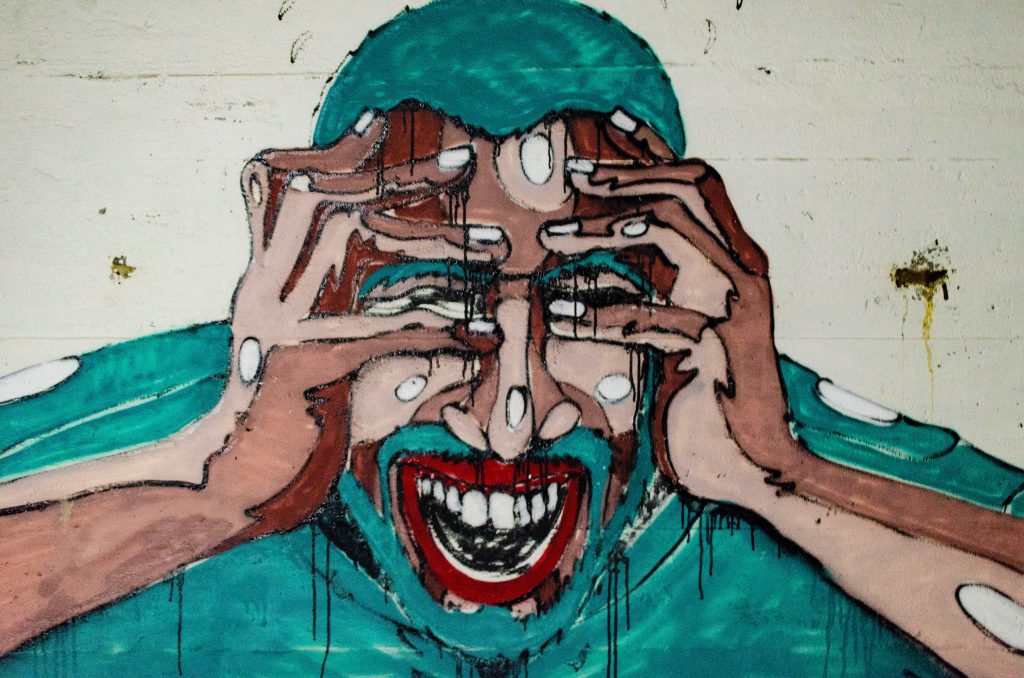
The majority of people exposed to trauma (COVID -19) do well. However, some individuals experience distress, others have behavioral changes and some will develop a psychiatric illness post-disaster which result you have to deal with stress.
Such illnesses include those that are secondary to physical injury (e.g., organic brain disorders, psychological responses to physical disease) as well as specific trauma-related psychiatric disorders such as acute stress disorder (ASD), posttraumatic stress disorder (PTSD) and trauma-related depression.
Anger, disbelief, sadness, anxiety, fear, and irritability are expected responses following this lockdown due to the economic impact of lost jobs and companies closed or moving.
Hence Stress during an infectious disease outbreak can include:
- Fear and worry about your own health and the health of your loved ones.
- Changes in sleep or eating patterns.
- Difficulty sleeping or concentrating subsequently, worsening of chronic health problems.
- Worsening of mental health conditions.
- Increased use of alcohol, tobacco, or other drugs affecting oral health.
2) Knowing Anxiety
Sigmund Freud used the term “anxiety neurosis” to describe a variety of anxiety-related symptoms, some taking the form of chronic, persistent anxiety.
Similarly, others characterized by “sudden onslaughts of anxiety,” a pattern to which we would probably apply the term“panic attack.
3) Stress and COVID -19
Evidence suggests that symptoms of anxiety and depression (16–28%) and stress (8%) are common psychological reactions to the COVID-19 pandemic. Likewise may be associated with disturbed sleep.

Some study is pointing out that the wide scope and spread of COVID-19 could lead to a true mental health crisis, especially in countries with high caseloads.
This will require both large-scale psychosocial crisis interventions, and the incorporation of mental health care in disaster management plans in the future.
Meanwhile, western countries have incorporated psychological interventions into their protocols for disease outbreaks.
However, this has not yet happened in countries such as India, leading to the emergence and persistence of stress-related disorders in affected persons.
4) Can stress be beneficial?

At times, stress has beneficial effects because it serves as organizing events and provides a sense of purpose and an opportunity for positive growth experiences. It pushes human limits. Above all, stress helps us to move forward.
Many of us might be building positive energy during this time so that we can develop ourselves in the coming days. But prolonged stress is the main culprit that pushes us back.
5) The phase of anxiety disorder after this disaster
The first, Phase, generally consists of strong emotions, including feelings of disbelief, numbness, fear, and confusion. People tend to cooperate, and heroic deeds are sometimes seen. In short, these reactions are best understood as ‘‘normal responses to an abnormal event.
Similarly, the second phase will last from a week to several months after Covid-19. At this time, assistance will flow in from agencies external to the community, and the cleanup/rebuilding process begins. In this phase of adaptation, denial will be seen.
The third phase will last up to a year and is marked by disappointment and resentment when expectations of aid and restoration will not be met.
To deal with stress this period the strong sense of community will weaken as individuals will focus on their personal concerns.
The final phase, reconstruction, may last for years. During this period survivors gradually rebuild their lives, making homes and finding work.
6) Dealing with stress due to corona
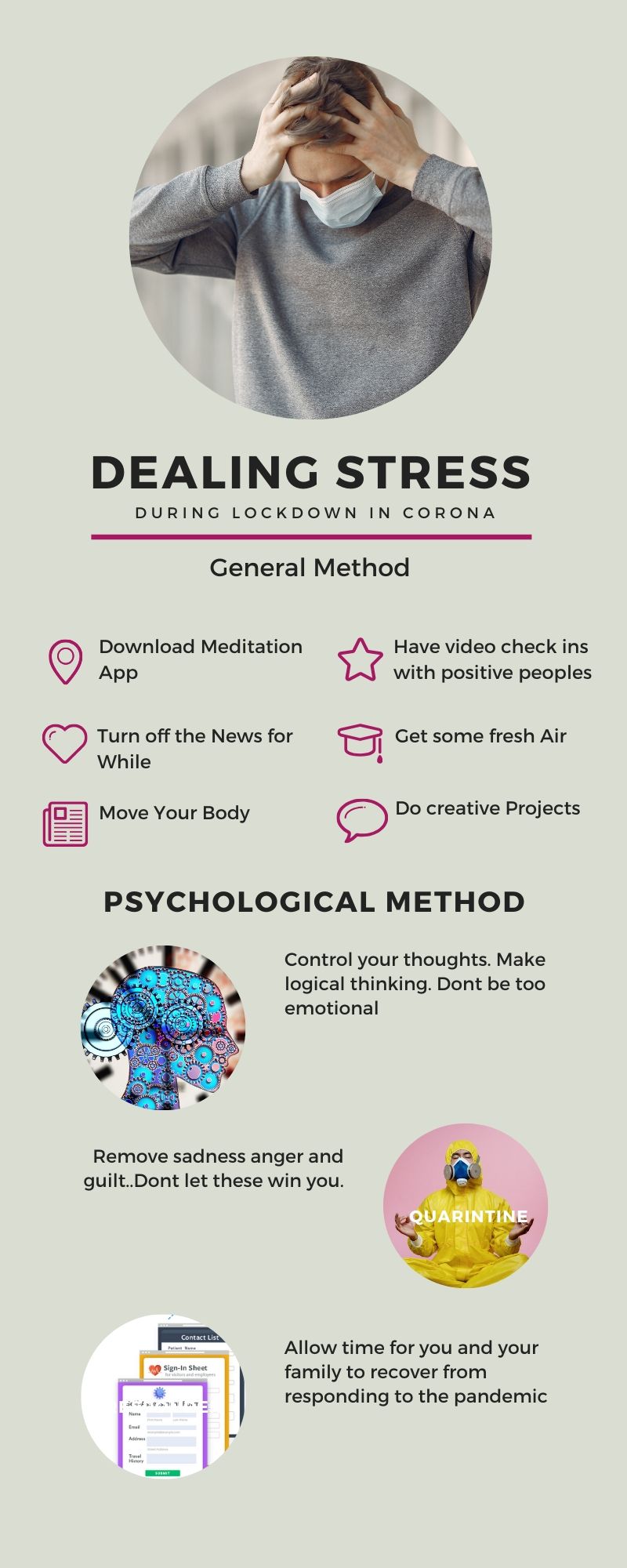
General Method
Exercise, good food can really help in such a situation. However, most of us know about them. In the same vein, we also know about strategies like:
- Assessment of the accuracy of the information,
- Enhancing social support,
- Reducing the stigma associated with the disease
- Maintaining as normal a life as feasible while adhering to safety measures
- Use of available psychosocial services, particularly online services, when needed.
In short, such methods, in my opinion, would empower society to handle the COVID-19 outbreak in an adaptive manner.
Psychological Method
Here we will discuss another aspect, psychological aspect.
Our brain is the controller of everything, what if we can control our thoughts.
it can deal with stress. Meanwhile, our brain has two types of thoughts, the first one being emotional thought and other being logical thought.
So if at present we have more emotional thought like, so many people are dying, what will have now, then we are just increasing stress.
Similarly, if we have more logical thinking like, ok corona will end in 15 days or lockdown will end by May 3. However, if things don’t go this way then again we will develop stress.
So the best way is going middle way, we can be emotional and again logical. Above all, we can think ok corona is doing a lot of harm but yes human has dealt with other disaster and hence will deal with this also.
Therefore, social distancing and lockdown are the best measures to fight, hence we will continue to do so as long as we win.
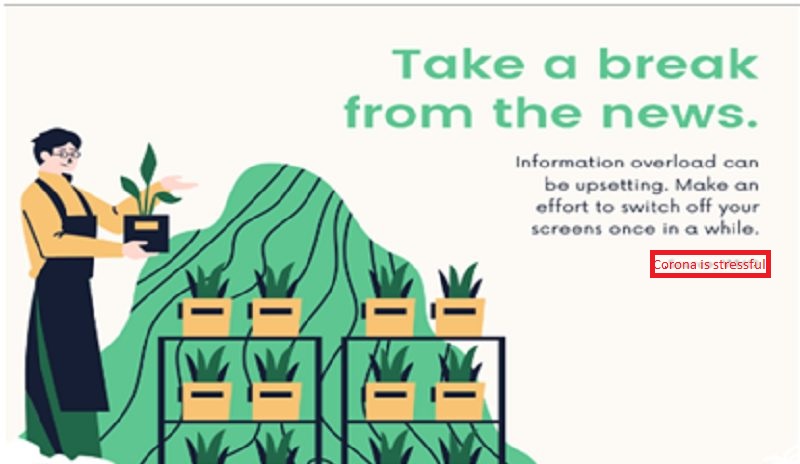
Involving ourselves in constructive work can again help during this situation. Meanwhile, at home we can involve in our children’s project work and involve in storytelling, cooking, gardening, helping poor.
Above all, diverting minds is a very efficient way of keeping stress away.
Think the opposite of the situation, in other words, if you are too happy thing something which will normalize you.
You can think about the migrant workers, if you are very sad then think about a happy situation.
Lastly, you can follow Sensation techniques, acupressure therapy, or pillow balls. This will divert the mind and help to relax. Similarly, eye movement therapy can also help to deal with stress.
For people coming out of quarantine
It can be stressful to be separated from others if a healthcare provider thinks you may have been exposed to COVID-19, even if you do not get sick.
In addition, everyone feels differently after coming out of quarantine.
Emotional reactions to coming out of quarantine may include:
- Mixed emotions, including relief after quarantine.
- Fear and worry about your own health. Most importantly, the health of your loved ones.
- Stress from the experience of monitoring yourself or being monitored by others for signs and symptoms of COVID-19.
- Sadness, anger, or frustration because friends or loved ones have unfounded fears of contracting the disease from contact with you, even though you have been determined not to be contagious.
- Guilt about not being able to perform normal work or parenting duties during the quarantine.
- Other emotional or mental health changes.
Children may also feel upset or have other strong emotions if they, or someone they know, have been released from quarantine they can also deal with stress.
For responders
Responding to COVID-19 can take an emotional toll on you. In addition, they may experience secondary traumatic stress. Secondary traumatic stress is stress reactions and symptoms resulting from exposure to another individual’s traumatic experiences, rather than from exposure directly to a traumatic event.

There are things you can do to reduce stress :
- Acknowledge that secondary traumatic stress can impact anyone helping families after a traumatic event.
- Similarly learn the symptoms including physical (fatigue, illness) and mental (fear, withdrawal, guilt).
- Allow time for you and your family to recover from responding to the pandemic.
- Create a menu of personal self-care activities that you enjoy, such as spending time with friends and family, exercising, or reading a book its helps you to deal with stress.
- Most importantly, take a break from media coverage of COVID-19.
- Further, ask for help if you feel overwhelmed or concerned that COVID-19 is affecting your ability to care for your family and patients as you did before the outbreak.
7) What the Government and Doctors can do?
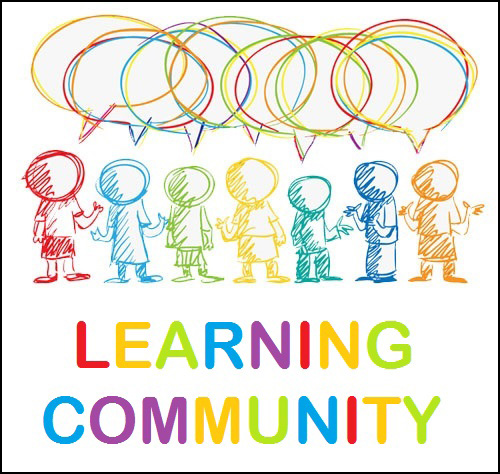
Government and doctors can follow these six important things to curve it:
- Education of the public about the common psychological effects of a pandemic,
- Motivate the public to adopt strategies for disease prevention and health promotion
- Integrate mental health services with available health care
- Teach problem-solving strategies to cope with the current crisis
- Empower patients with COVID-19 and their caregivers
- Provision of mental health care to healthcare workers
You can also read My other blog:
Health and hygiene | BJP – bartan jhadu poocha 10 Female secret advice:
House party:10 ways of organizing an awesome house party
Healthy Diet Patterns You Should Follow in 2020 for health
Migraine: Comparing effectiveness of 6 types of major diets
Everything You Want To Know About Low Carbohydrate Diet
Healthy Breakfast Recipes To Boost Your Morning
TOOTHACHE: 7 DENTAL HYGIENE TO RELIEF FROM IT
8) Conclusion
Community preparedness planning for COVID-19 should include older adults and people with disabilities. In addition, the organizations that support them in their communities, to ensure their needs are taken into consideration.
- Many of these individuals live in the community, and many depend on services and supports provided in their homes or in the community to maintain their health and independence.
- Long-term care facilities should be vigilant to prevent the introduction and spread of COVID-19.
9) Frequently Asked Questions
Ans. People with pre-existing mental health conditions should continue with their treatment plans during an emergency and monitor for any new symptoms. to deal with stress read the above blog.
Ans. The emotional impact of an emergency on a person can depend on the person’s characteristics and experiences, the social and economic circumstances of the person and their community, and the availability of local resources.
Ans. Avoid excessive exposure to media coverage of COVID-19. Take breaks from watching, reading, or listening to news stories. It can be upsetting to hear about the crisis and see images repeatedly. Try to do some other activities you enjoy to return to your normal life. When you do read the news, avoid media outlets that build hype or dwell on things that can’t be controlled.
Ans. One of the most important things you can do to help manage your grief includes acknowledging it in the first place. “The more we can say to ourselves and the people around us, ‘Yes, these are meaningful losses,’ the more seen and soothed we will feel,” Lori Gottlieb, a therapist, and author, recently wrote in The Times.
Ans. People can become more distressed if they see repeated images or hear repeated reports about the COVID-19 outbreak in the media.
